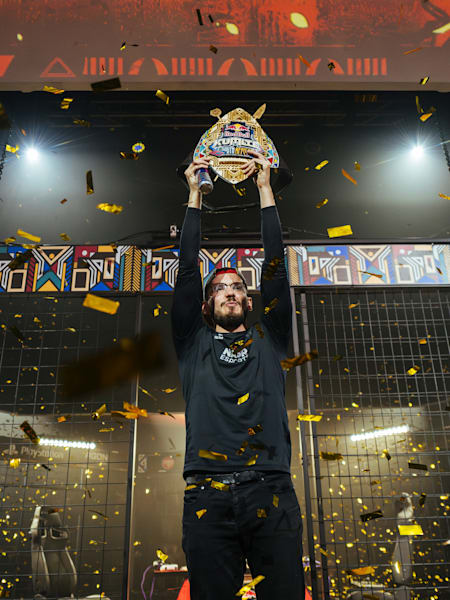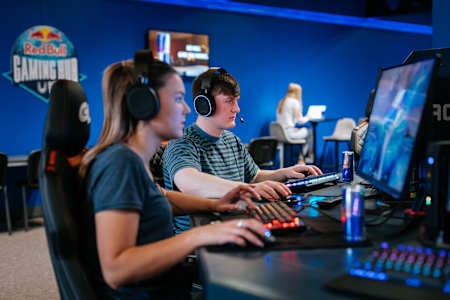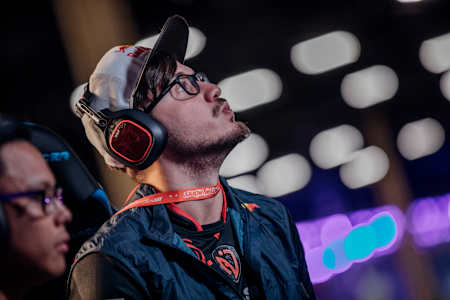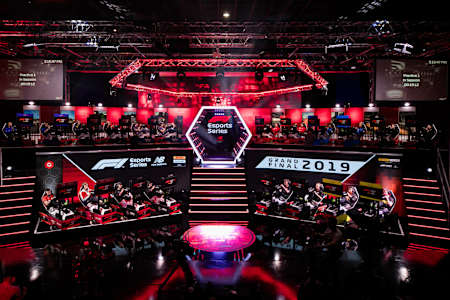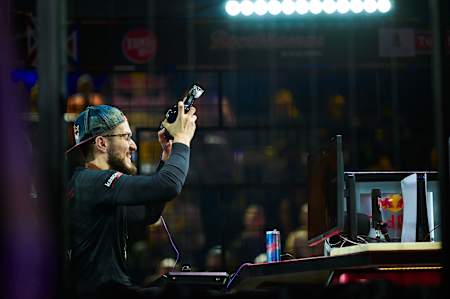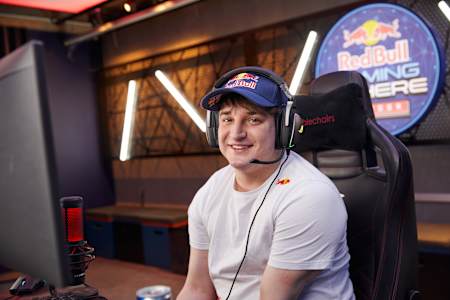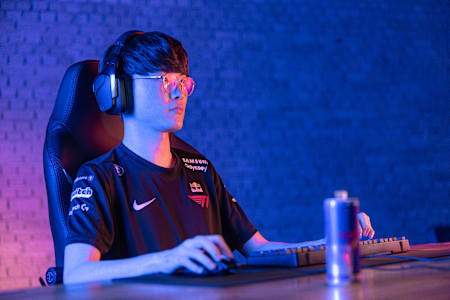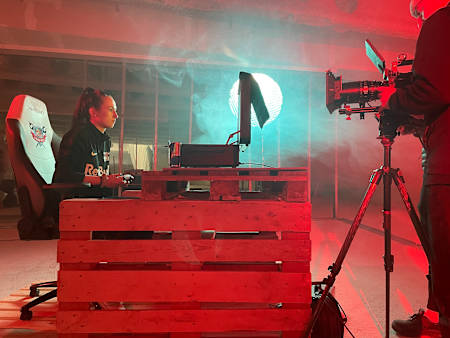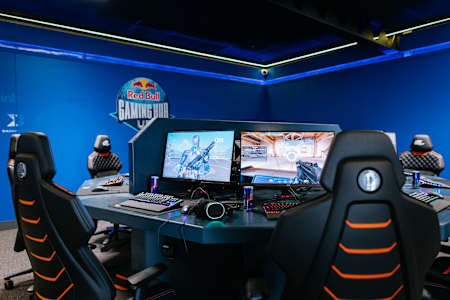Gaming
If we've learnt anything in the past few years, it's that life is far too short to be stuck on a Zoom call. Gone are the days of putting your hopes and ambitions on the backburner – now is the time to dream a little.
Particularly now that gaming-dedicated Red Bull Gaming Hub centers are popping up all over the world, from Toronto to Monetenegro and Ireland. These spaces are stacked with state-of-the-art gaming equipment, ensuring budding esports players can have the ultimate focus on their chosen titles. If you want to make gaming a lucrative 9-5 job, these hubs are a brilliant place to start.
Becoming a pro gamer will test you in ways you've never been tested. It requires hard work, talent, a whole lot of luck and, yes, occasionally some world class facilities as shown above – but it's not impossible. If you're lucky you could be participating at major gaming events like Red Bull Kumite, Red Bull Home Ground and Red Bull Campus Clutch.
Here, we've put together a list of realistic tips on how to succeed. Let's just clear up a few basics first...
01
What's a pro gamer and what skills are needed to be one?
A professional gamer (in the purest sense of the term) is someone who competes at major esports competitions and takes their preparation every bit as seriously as a footballer or tennis player might do for their respective discipline.
Typically, they have one genre they specialize in and may hop between titles. Others stay focussed firmly on one game. Take Adel 'Big Bird' Anouche: he's a fighting game stalwart who may have flirted with Dragon Ball Z down the years, but has mostly focused on Street Fighter on the road to becoming one of the greatest to ever do it. His recent Red Bull Kumite 2023 win in South Africa is proof of that.
It's also very common to see elite players represent major esports organizations, otherwise known as 'orgs,' who assemble the best talent out there. Players can get picked up by online leaderboards, LAN events, streaming presence or a combination of all three.
But knowing how to be a gamer who's able to stand out from the crowd and who can mix it with the very best is easier said than done. Getting to the top not only requires countless hours of practice, natural talent also plays a huge part, which often includes – but isn't restricted to – gaming IQ, coolness under pressure, finding your flow and super-fast reflexes.
02
How competitive is the gaming industry and esports?
Extremely. If it's not chasing the next tournament pay cheque, keeping the content coming for your loyal Twitch subscribers or simply staying one step ahead of the competition, even the biggest esports stars are constantly juggling plates. It's usually far from a long career either, with the average age of pro player retirement just 26. That's not to say an older player couldn't make it pro, it just highlights how fast of mind and digits you have to be.
Yep, it's a hard slog to make it pro and a short lifespan when you're there, but fairy tales do happen. Just like in the brilliant documentary DRX The Rise (below), which charts how underdog LCK team DRX came from seemingly nowhere to win Worlds 2022 in a surprise victory.

54 min
DRX The Rise
Team DRX entered the League of Legends World Championship 2022 as underdogs – but they left as legends.
03
How much do gamers earn?
That all depends. Some players will earn millions per year, others will earn hundreds of thousands and then there are those who make an honest career and just about get by.
Earnings depend on the competition or status of the player. While entrants into the The International have been known to battle for a prize pool of $32,185,050 the winner of a racing sim event might not even get close to $32,185. Given this disparity, many esports stars supplement their income with sponsorships, brand deals, merchandising and advertisements from their streaming channels.
But if you're going to take up an esports career for the money, then perhaps it isn't for you. The odds are stacked too high against the average player to crack the glass ceiling to go into this industry solely for the cash.
04
Your step-by-step guide to gaming success
Now without further ado, here's a list of ways to make it as a pro gamer...
1. Tap into your passion
What are you good at? What video game do you love to play? Forget those dollar signs in your eyes, the fame – all that can wait. Before anything else, you must find a title you’re passionate about that marries with your talents. You're going to have to knuckle down and play said title until your thumbs go numb, day after day, so most importantly you’ll want to find a game that keeps you hooked. That goes for characters, too: Red Bull Kumite 2023 champion Big Bird advises any fighting game players to pick one character and stick with it.
Then, check if a video game you're passionate about has any esports value. Does it have many tournaments? If so, is there decent prize money on offer or other perks? Next, find out what it takes to qualify for these tournaments and where they take place. Finally, dig in to the list of tips below and embark on your quest for gaming world domination.
I meditate before a game to clear my mind of anything going on around me. I also prepare with stretching
2. Find events and LAN tournaments near you
As you grow in confidence, find out if there are any LAN (Local Area Network) events you can enter near you. The experience and exposure you can generate at these in-person events is unmatched, and you'll find a far better gauge of how you play in front of a crowd when the pressure is on than you ever would online.
Moreover, if you’re a fan of FPS games, you’re in luck. Spanning 50 countries and some 300 universities, Red Bull Campus Clutch is a VALORANT tournament that you simply don't want to miss. Exclusively open to students, it gives you a chance to feel every inch the pro player in an elite esports competition. For non students, Red Bull Home Ground, which takes place in Tokyo, Japan, in 2023, pits top pro VALORANT teams against each other.
3. Stream to be seen
Tiffany 'Tiffae' Hsu built up streaming numbers while studying at college
© Kena Krutsinger / Red Bull Content Pool
Esports isn't the only way to get paid to play games professionally. Streaming platforms like Twitch and TikTok allow gamers to build up large and loyal audiences that allow them to earn thousands through subscriptions alone. Elite streamers cultivate, engage and bond with their audiences, creating digital campfires for everyone to come around to keep warm. It works both ways, too, with even the most talented streamers benefitting from loyal support and relationships forged over time.
Streamers earn some of the biggest money in gaming. It’s also a fantastic way to build a community. Sharing your gaming experiences with others will not only teach you what it's like to play with eyeballs on you, but encourage you to pick up a controller or switch on the PC when you’re lacking motivation.
4. Climb the online ladder
Liam 'Jukeyz' Lunt made his name by winning Call of Duty tournaments
© Will Douglas/Red Bull Content Pool
Nothing beats self-promotion. If you want to get noticed, put the hours in and grind. By reaching the very top of your game you may be able to unlock opportunities elsewhere. Many of the competitors at FIFA's prestigious esport tournaments found their way there by going unbeaten on Weekend League. Climb the ladder in your favorite game and you’ll build yourself a virtual CV before you know it.
The moment everything changed for Call of Duty favorite Liam 'Jukeyz' James was winning Syndicate Sundays, which he’d qualified for by achieving Prestige Rank 1 status, and also being able to stream his gameplay on social. He calls it the best thing he ever did: "When I won Syndicate Sundays, the first-ever major tournament hosted on Warzone, my team were massive underdogs. Everyone else seemed to have pros on their team. We basically did the impossible. Anyway, Tom Syndicate was watching me, and everyone was watching him, so a lot of people started supporting me after that moment. My stream had been doing pretty good until then, but that was the kick-start. From then onwards it was crazy."
5. Go green
LoL player Faker keeps his mind calm with houseplants in his line of sight
© Daebong Kim / Red Bull Content Pool
How to be a gamer who stays focused? Go green. When The Red Bulletin spoke to League of Legends star Faker about the secrets behind his success, nobody expected him to name the humble houseplant. But he did: "I put them in visible places to remind me to water them," he explained. “They ease my eyes and keep my mind calm. And the color green has a calming effect.” He's not wrong. Plants have been scientifically proven to increase focus and help the brain, and considering how gaming is a very domesticated discipline, leafy additions to the house might just give you an edge.
Another method Faker uses to keep his mind sharp is meditation: “I'm used to playing under pressure and I've developed ways to keep calm," he says. "I meditate before a game to clear my mind of anything going on around me. I also prepare with stretching."
If you have confidence you can beat anyone, or at least put up a tough fight
6. Capitalise on the meta
The meta (Most Effective Tactics Available) is the en vogue strategy to win a game. And when a big new release hits the shelves or a patch raids your memory banks, the meta can shift quicker than Sonic, leveling the playing field between amateur players and pros overnight. If you're able to work hard enough to a master a meta early on, it could be enough to push you up in the ranks until you're vying with the best.
7. Strike a balance
Don't Jerry Maguire it and put your entire life on the line to pursue a dream. The chances of going from semi-decent amateur to challenging the world's best overnight are slim. Instead, start by gradually increasing the amount of time you put into the game, grinding as much as you can, scouring through YouTube tutorials, asking rivals for feedback and ultimately ironing out any weaknesses in pursuit of greatness. Try to incorporate gaming into your lifestyle as much as possible and, who knows, one day you might end up like footballer Lena Guldenpfennig, who scores goals for RB Leipzig's women’s team by day, but also wins esports matches for the club's esports team by night.
8. Get more sleep
Barry Bridges, a Sports Science graduate and professional sports coach, has previously told Red Bull that getting a full 40 winks might just be the difference between killing it at an esports tournament and an early ticket home: "Sleep helps us restore long-term memory, which is vital for gaming – especially when learning new game skills while scrimming. Proper sleep regulates your digestive system, helps prevent burnout and fatigue, and also assists with faster reaction and hand-eye coordination – all of which are vital for a competitive player."
9. Don't get stuck in a rut
We might be long past the tired cliches of full-time gamers operating out of their parents' basement, but if you're going to reach the top you'll probably be spending a lot of time in the same place. To combat mental fatigue, look for new places to train and meet new players, such as at a Red Bull Gaming Hub. For example, Red Bull recently opened its largest esports venue in Aarhus, Denmark, which boasts 160 PC gaming stations, an esports arena, a streaming room, a console area, Sim-racers and snack bar courtesy of the wonderfully named Bytes.
10. Hype yourself up
Think like a champion and you'll become a champion. Okay, it's not quite that simple, but having confidence in your own play, whether it's a cocky stride when walking up to a gaming chair or deep belief that you can turn around a match even when the chips are down, is a huge plus. Speaking after a win at Red Bull Flick 2020, Sekiro of CS:GO team F1REPOWER said, "Confidence is key, no matter what. Sometimes, when someone has a higher level than you and it makes you feel like 'wow, maybe we lose this,' that's not the case. If you have confidence you can beat anyone – or at least put up a tough fight."
11 Take advice from the pros
Loads of people have gone before you, so find out what they've got to say about how they succeeded and how they overcame problems. There's loads online you can tap into from streamers on Twitch, TikTok and YouTube. For starters, listen to the Mind Set Win podcast episode below where Sébastien ‘Ceb’ Debs shares how to work with a team so every member can perform at their optimum level.
Part of this story

